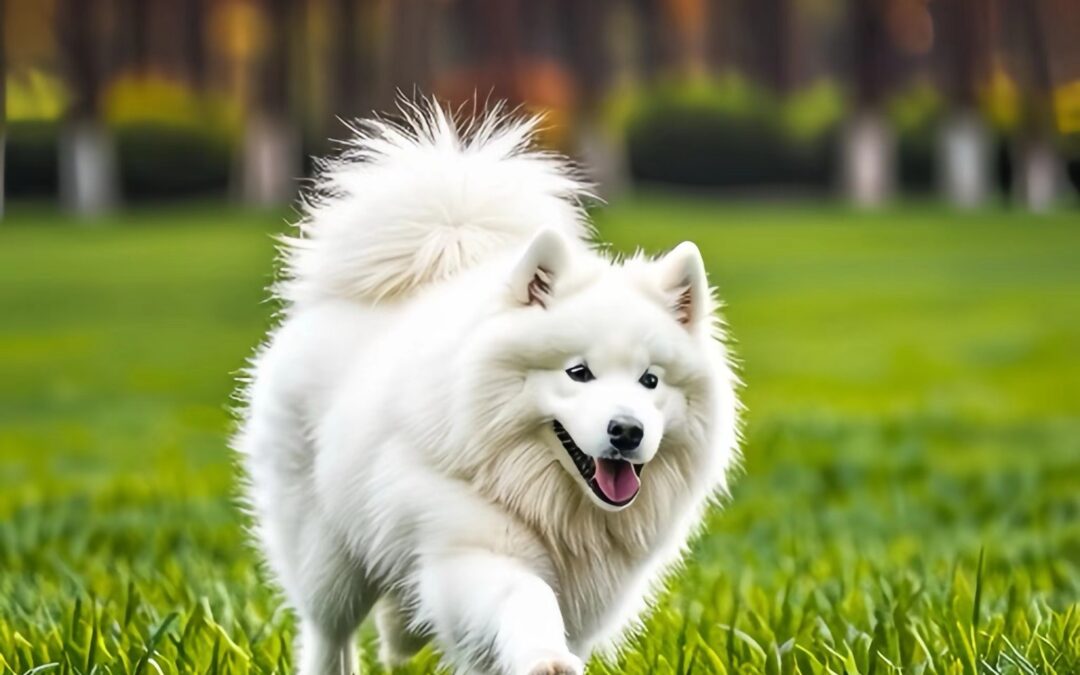
by TCMVET | Jun 9, 2024 | pet Chinese herbal medicine
In recent years, Traditional Chinese Medicine (TCM) has gained popularity not just for human health, but also for the well-being of our furry friends. TCM offers a holistic approach to canine health, focusing on balance and harmony within the body. This article will delve into the unique benefits of TCM for dogs, exploring various treatments and their applications in modern veterinary care.
Understanding Traditional Chinese Medicine for Dogs
Traditional Chinese Medicine is an ancient system of health care that has been practiced for thousands of years. It includes various modalities such as acupuncture, herbal medicine, and dietary therapy, all aimed at restoring balance to the body’s vital energies or “Qi.”
Benefits of TCM for Dogs
- Natural Healing: TCM uses natural herbs and treatments, making it a gentle and effective option for dogs. Unlike some conventional medications, TCM typically has fewer side effects and can be tailored to each dog’s specific needs.
- Holistic Approach: TCM practitioners view the body as an interconnected system. Treatments aim to address the root causes of health issues rather than just alleviating symptoms. This holistic approach can lead to more comprehensive and lasting health improvements.
- Preventive Care: One of the core principles of TCM is prevention. Regular TCM treatments can help maintain your dog’s overall health, boosting immunity, improving digestion, and enhancing vitality.
- Pain Management: Acupuncture and herbal remedies are particularly effective in managing pain, especially for conditions like arthritis, hip dysplasia, and post-surgical recovery. These treatments can provide relief and improve the quality of life for senior dogs or those with chronic conditions.
Common TCM Treatments for Dogs
- Acupuncture: Acupuncture involves inserting fine needles into specific points on the body to stimulate healing and relieve pain. It can be used to treat a variety of conditions, including musculoskeletal issues, neurological disorders, and digestive problems.
- Herbal Medicine: TCM herbal formulas are tailored to each dog’s individual constitution and health needs. Commonly used herbs include astragalus for boosting the immune system, licorice for its anti-inflammatory properties, and turmeric for its antioxidant benefits.
- Dietary Therapy: Diet plays a crucial role in TCM. Foods are chosen based on their energetic properties and their ability to balance the body’s Qi. For example, cooling foods like cucumber can help reduce inflammation, while warming foods like ginger can boost circulation.
- Tui Na Massage: Tui Na is a form of Chinese therapeutic massage that helps stimulate acupuncture points, improve circulation, and promote relaxation. It can be particularly beneficial for dogs with anxiety, joint issues, or muscle tension.
Integrating TCM with Conventional Veterinary Care
TCM can complement conventional veterinary treatments, providing a more comprehensive approach to your dog’s health. Many veterinarians are now recognizing the benefits of integrative medicine, combining the best of both worlds to enhance treatment outcomes.
Conclusion
Traditional Chinese Medicine offers a unique and effective approach to canine health, emphasizing natural healing, holistic care, and prevention. By integrating TCM into your dog’s healthcare routine, you can help ensure a balanced and vibrant life for your furry friend. Whether through acupuncture, herbal medicine, dietary adjustments, or therapeutic massage, TCM provides valuable tools to support your dog’s well-being in a natural and harmonious way.

by TCMVET | Jun 9, 2024 | Dog Cancer & Tumors
Stomach cancer in dogs is a dreaded diagnosis for any pet owner. Although it is relatively rare, its impact can be profound. Understanding the causes of stomach cancer in dogs and how to prevent it is crucial for every pet parent. In this article, we will explore some lesser-known causes of stomach cancer in dogs and offer practical tips for prevention.
What is Stomach Cancer in Dogs?
Stomach cancer, also known as gastric cancer, is a malignant tumor that develops in the lining of a dog’s stomach. The most common type of stomach cancer in dogs is adenocarcinoma, but other types like leiomyosarcoma, lymphoma, and mast cell tumors can also occur.
Surprising Causes of Stomach Cancer in Dogs
- Genetic Predisposition: Some dog breeds are more prone to developing stomach cancer due to genetic factors. Breeds such as the Belgian Shepherd, Rough Collie, and Staffordshire Bull Terrier have a higher incidence of gastric cancer.
- Diet and Nutrition: A poor diet lacking in essential nutrients can contribute to the development of stomach cancer. Feeding your dog low-quality, highly processed foods with artificial additives and preservatives can increase the risk.
- Environmental Factors: Exposure to certain environmental toxins, such as pesticides, herbicides, and industrial chemicals, can increase the likelihood of a dog developing stomach cancer. Dogs living in areas with high pollution levels are particularly at risk.
- Helicobacter Infection: Chronic infection with Helicobacter pylori, a type of bacteria, has been linked to the development of stomach cancer in both humans and dogs. This bacterium can cause long-term inflammation and damage to the stomach lining, leading to cancer.
- Age and Health Conditions: Older dogs and those with pre-existing health conditions, such as chronic gastritis or inflammatory bowel disease (IBD), are more susceptible to developing stomach cancer. The prolonged inflammation and irritation can lead to malignant transformations in the stomach lining.
Prevention Tips for Dog Owners
- Provide a Balanced Diet: Ensure your dog receives a well-balanced diet rich in high-quality proteins, healthy fats, and essential vitamins and minerals. Avoid foods with artificial additives, preservatives, and low nutritional value.
- Regular Veterinary Check-ups: Regular veterinary check-ups are essential for early detection of any health issues. Your vet can perform routine screenings and recommend preventive measures based on your dog’s specific needs.
- Minimize Exposure to Toxins: Reduce your dog’s exposure to environmental toxins by avoiding the use of harmful chemicals in your home and garden. Opt for natural and pet-safe alternatives whenever possible.
- Maintain a Healthy Weight: Obesity can increase the risk of various cancers, including stomach cancer. Ensure your dog maintains a healthy weight through a balanced diet and regular exercise.
- Monitor for Symptoms: Be vigilant for any signs of stomach cancer, such as vomiting, loss of appetite, weight loss, abdominal pain, and blood in the vomit or stool. Early detection can significantly improve the chances of successful treatment.
Conclusion
While stomach cancer in dogs is a serious and potentially life-threatening condition, understanding the surprising causes and implementing preventive measures can help reduce the risk. By providing a healthy diet, regular veterinary care, and a toxin-free environment, you can contribute to your dog’s overall well-being and longevity.

by TCMVET | Jun 7, 2024 | Dog Cancer & Tumors
Soft tissue sarcoma in dogs represents a diverse group of cancers that arise from the connective tissues of the body. These can include fat, muscle, nerves, fibrous tissues, and the pericytes of small blood vessels. This article will explore the symptoms, diagnosis, and the range of treatment options available, encompassing both conventional and holistic approaches.
Understanding Soft Tissue Sarcoma in Dogs
Soft tissue sarcomas (STS) are relatively uncommon in dogs, yet they are significant due to their aggressive nature. They typically manifest as a single lump or mass on a dog’s body, which can grow rapidly. These tumors can occur anywhere but are most often found on the limbs, trunk, and head.
Symptoms of Soft Tissue Sarcoma
The symptoms of soft tissue sarcoma in dogs are often subtle initially. The most common sign is the presence of a non-painful mass. As the tumor grows, it may become more noticeable and can cause discomfort or interfere with the dog’s normal activities, depending on its location.
Diagnosis of Soft Tissue Sarcoma
Diagnosis starts with a thorough physical examination followed by diagnostic imaging like X-rays or an MRI to determine the size and extent of the tumor. A definitive diagnosis is typically achieved through a biopsy, where a small sample of the tumor is examined microscopically.
Conventional Treatments for Soft Tissue Sarcoma
Surgical Removal
Surgery is often the first line of treatment for soft tissue sarcoma. The goal is to remove the tumor along with some surrounding healthy tissue to ensure all cancerous cells are eliminated.
Radiation Therapy
Radiation is generally recommended if surgical margins are narrow, meaning there might be some residual cancer cells. It helps to control the spread and improve the quality of life.
Chemotherapy
Chemotherapy may be considered in cases where the sarcoma is known to be high grade or has metastasized (spread to other areas of the body).
Holistic and Supportive Treatments
Diet and Nutrition
A balanced diet rich in nutrients can help support a dog’s immune system. Supplements such as fish oil, turmeric, and antioxidants may be recommended to support overall health.
Herbal Remedies
Holistic practitioners might suggest herbs that support health and well-being. For example, Turkey Tail mushroom is known for its potential anti-cancer properties and may be used in conjunction with conventional treatments.
Physical Therapy
For dogs recovering from surgery or those affected by tumors on the limbs, physical therapy can help maintain muscle strength and mobility.
The Role of Regular Veterinary Care
Regular check-ups are crucial for early detection and management of any potential recurrence. Follow-up visits often involve physical exams and repeat imaging to monitor for new tumor growth.
Conclusion
Managing soft tissue sarcoma in dogs requires a comprehensive approach that combines the precision of conventional medicine with the supportive benefits of holistic care. By understanding the options available, pet owners can make informed decisions about their dogs’ health, aiming not just for survival but for a good quality of life.

by TCMVET | Jun 7, 2024 | Dog Cancer & Tumors
Ovarian cancer in dogs, though rare, is a serious condition that requires attention. Early detection can greatly improve the prognosis and quality of life for affected dogs. In this article, we’ll explore the causes and early signs of ovarian cancer in dogs, providing valuable information to help you recognize and address this condition promptly.
Causes of Ovarian Cancer in Dogs
Genetic Factors
Genetics play a significant role in the development of ovarian cancer in dogs. Certain breeds are more prone to cancer due to inherited genetic mutations. Breeds such as Golden Retrievers, Boxers, and German Shepherds have shown higher incidences of various cancers, including ovarian cancer.
Hormonal Imbalances
Hormonal imbalances can contribute to ovarian cancer in dogs. Unspayed female dogs are at a higher risk due to prolonged exposure to estrogen. Spaying your dog can significantly reduce the risk by eliminating the primary source of estrogen.
Age
Older dogs are more commonly diagnosed with ovarian cancer. As dogs age, their cells are more likely to undergo mutations that can lead to cancer. Regular veterinary check-ups are crucial for early detection, especially as your dog gets older.
Environmental Exposure
Exposure to environmental toxins and carcinogens can increase the risk of ovarian cancer in dogs. This includes exposure to secondhand smoke, pesticides, and industrial chemicals. Keeping your dog’s environment clean and minimizing exposure to harmful substances can help reduce this risk.
Early Signs of Ovarian Cancer in Dogs
Recognizing the early signs of ovarian cancer in dogs is essential for timely intervention. Here are some common symptoms to watch for:
Abdominal Swelling
One of the most noticeable early signs of ovarian cancer in dogs is abdominal swelling. This can result from the tumor itself or from fluid accumulation in the abdomen (ascites). If your dog’s abdomen appears unusually enlarged, seek veterinary care immediately.
Lethargy and Weakness
Dogs with ovarian cancer often exhibit lethargy and weakness. They may become less active, sleep more than usual, and lose interest in their favorite activities. This change in behavior can be subtle but is significant.
Weight Loss
Unexplained weight loss is another early sign of ovarian cancer in dogs. Despite having a normal or increased appetite, affected dogs may lose weight due to metabolic changes caused by the cancer.
Changes in Appetite
Changes in appetite, including both increased and decreased eating habits, can indicate ovarian cancer. Some dogs may refuse food altogether, while others may seem hungrier than usual but still lose weight.
Vomiting and Diarrhea
Gastrointestinal issues such as vomiting and diarrhea are common in dogs with ovarian cancer. These symptoms can be intermittent or persistent and are often accompanied by other signs of illness.
Abnormal Vaginal Discharge
In female dogs, abnormal vaginal discharge can be an early sign of ovarian cancer. This discharge may be bloody or pus-like and can occur regardless of the dog’s reproductive status.
Behavioral Changes
Behavioral changes, such as increased irritability or depression, can also be early indicators of ovarian cancer in dogs. These changes often result from the discomfort and pain caused by the tumor.
Conclusion
Understanding the causes and early signs of ovarian cancer in dogs is essential for pet owners. Early detection and intervention can make a significant difference in the outcome for affected dogs. If you notice any of the symptoms mentioned above, consult your veterinarian for a thorough examination and appropriate diagnostic tests.
By staying informed and vigilant, you can help ensure your dog receives the best possible care and maintain their quality of life. Remember, regular veterinary check-ups and preventive measures, such as spaying, play a vital role in safeguarding your dog’s health against ovarian cancer.
For more information on dog health and holistic treatments, visit our blog at TCMVET, where we provide cutting-edge research and insights into natural supplements and cancer care for pets.

by TCMVET | Jun 7, 2024 | Dog Cancer & Tumors
As a pet owner, discovering a sudden lump under your dog’s skin can be alarming. These unexpected growths can vary in size, shape, and texture, and while some may be harmless, others can indicate serious health issues. This article will guide you through understanding the potential causes of sudden lumps, the importance of early detection, and the treatment options available.
Common Causes of Sudden Lumps in Dogs
- Lipomas: These are benign fatty tumors commonly found in older dogs. They are generally soft, movable, and painless.
- Cysts: These fluid-filled sacs can form due to blocked hair follicles or oil glands. They may rupture and need medical attention.
- Abscesses: Infections can lead to abscesses, which are painful, pus-filled lumps often caused by bites, scratches, or wounds.
- Hematomas: These are blood-filled swellings resulting from trauma or injury, often seen in the ears or other areas prone to bruising.
- Mast Cell Tumors: These cancerous lumps can appear suddenly and grow quickly. They require immediate veterinary assessment and treatment.
- Sebaceous Adenomas: These are benign tumors arising from sebaceous glands, often appearing as wart-like lumps on the skin.
Importance of Early Detection
Early detection of lumps in dogs is crucial for several reasons:
- Preventing Complications: Identifying lumps early can prevent them from growing or causing other health issues.
- Determining Malignancy: Early diagnosis helps determine if a lump is benign or malignant, allowing for prompt treatment if needed.
- Improving Prognosis: Timely intervention can improve the prognosis for dogs with cancerous lumps, increasing the chances of successful treatment.
Steps to Take if You Discover a Lump
- Observe the Lump: Note the size, shape, texture, and any changes over time. Keep track of any other symptoms your dog may exhibit, such as lethargy, loss of appetite, or changes in behavior.
- Consult Your Veterinarian: Schedule an appointment with your vet to have the lump examined. Your vet may perform a fine needle aspiration (FNA) or biopsy to determine the nature of the lump.
- Follow Through with Recommended Tests: Depending on the initial findings, additional tests such as blood work, X-rays, or ultrasound may be necessary to get a complete picture of your dog’s health.
Treatment Options for Sudden Lumps
The treatment for lumps in dogs varies depending on the underlying cause:
- Surgical Removal: Benign and malignant tumors may require surgical excision. In some cases, this is curative, while in others, it may be part of a broader treatment plan.
- Medications: Antibiotics or anti-inflammatory medications may be prescribed for infections or abscesses. For some tumors, chemotherapy or radiation therapy might be recommended.
- Holistic and Natural Treatments: Supplements like TCMVET Baituxiao and Turkey Tail mushrooms have shown promise in managing tumors naturally and supporting overall pet health. Always consult your vet before starting any new treatment regimen.
Preventive Measures and Monitoring
- Regular Check-ups: Schedule regular veterinary check-ups to monitor your dog’s health and catch any potential issues early.
- Healthy Diet and Exercise: Maintain a balanced diet and regular exercise routine for your dog to support their overall health and immune system.
- Regular Grooming and Inspections: Regular grooming and skin inspections can help you notice any new lumps or changes in your dog’s skin condition.
Conclusion
While discovering a sudden lump under your dog’s skin can be concerning, understanding the potential causes and seeking prompt veterinary advice can make a significant difference in your pet’s health. Early detection and appropriate treatment are key to managing these lumps effectively. Remember to stay vigilant, consult your vet, and explore all treatment options, including natural supplements, to ensure the best care for your furry friend.
Tags: Dog Health, Sudden Lumps in Dogs, Lipomas in Dogs, Canine Cysts, Dog Abscess Treatment, Mast Cell Tumors in Dogs, Veterinary Oncology, Holistic Treatments for Dogs, Natural Supplements for Dogs, TCMVET Baituxiao, Turkey Tail Mushrooms for Dogs.





